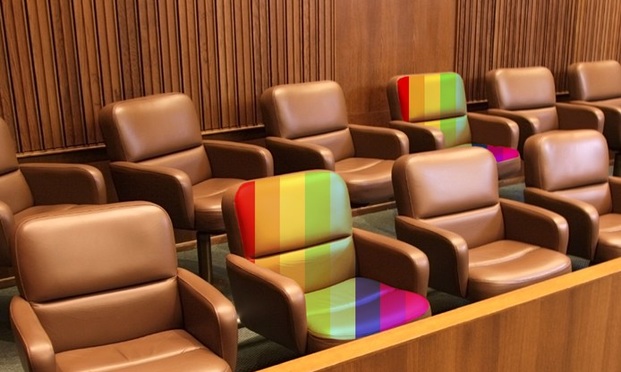Court of Appeal Tosses Verdict Because of Prosecutor's Bias Against Gay Jurors
The Third District Court of Appeal in California tossed a criminal conviction in a case where a prosecutor used peremptory strikes on two gay jurors claiming that they'd be biased against a witness—a closeted gay man.
May 04, 2018 at 04:52 PM
4 minute read

A California appellate court has tossed a criminal jury verdict, finding that prosecutors improperly used peremptory strikes on two gay jurors.
A divided panel of the Third District Court of Appeal on Thursday found that, on top of legitimate concerns about the jurors, the prosecutor had also said the openly gay men might be biased against the victim and lead witness in the case, a closeted gay man.
“The bias alleged by the prosecutor was a product of the prosecutor's impermissible group assumptions, unsupported by the record and based solely on the two jurors' sexuality,” wrote Justice Elena Duarte, who was joined in the opinion by Justice Coleman Blease. “Whether intended or not, that rationale reflects invidious sexuality discrimination that is not permissible.”
The decision is a win for defendant Brady Lee Douglas, his lawyer Kieran Manjarrez of Santa Rosa, and a group of amici represented by Sonali Maitra and Raghav Krishnapriyan of Durie Tangri. Krishnapriyan said in an email Friday that the firm got involved in the case on behalf of Equality California, Lambda Legal, and the National Center for Lesbian Rights in May shortly after the court granted Douglas' petition for a rehearing in the case.
“It pretty quickly became apparent to us that this was an ideal case for our firm to jump in on behalf of the amici: it's an issue of first impression in California, it has broad implications for the rights of criminal defendants—especially those from groups that have been historically disfavored by the judicial system, and the legal issue was cleanly presented by the facts below,” Krishnapriyan said.
In the underlying case, Douglas was convicted of charges related to a high-speed freeway chase where he shot at the car of a man who allegedly had a short-changed his then-boyfriend, a male prostitute.
During voir dire in the case, the prosecutor asked to dismiss the only two gay men among the prospective jurors. When the defense team raised objections, the prosecutor pointed out that one of the men had a long-standing and close relationship with a public defender who had told him she would never “go to the dark side”—meaning become a prosecutor. The other, the prosecutor said, had been engaged and attentive when the defense team spoke, but leaned back and gave short answers when interacting with the prosecution.
On top of those reasons, the prosecutor said the openly gay men might be biased against the lead witness, who until the events that led to trial had been a closeted gay man.
The trial court accepted the prosecutor's relationship- and demeanor-based challenges and didn't address the bias issue.
In Thursday's majority opinion, the Third District said the treatment of the judge below amounted to a “mixed-motive” analysis—an approach that arose in the employment context as a way for employers to show they would have taken adverse action against an employee whether or not any discriminatory factor also contributed.
“We hold it is not appropriate to use that test when considering the remedy for invidious discrimination in jury selection, which should be free of any bias,” Duarte wrote.
Durie Tangri's Krishnapriyan noted that the court emphasized the result was based not only on federal constitutional grounds, but on “the California Constitution's due process clause and its guarantee of a jury composed of a representative cross-section of the community.”
In a dissent, Third District Justice Harry Hull Jr. wrote that his colleagues were “well-meaning” but “misguided.” He wrote that he would have remanded the issue to the trial court for mixed -motive analysis of the prosecutor's decision.
“The majority justifies its decision under the broad rubric of fairness and equality, but there may not have been, in the final analysis, anything unfair or unequal in defendant's trial,” Hull wrote. “Reversing the unbiased jury's convictions for a very serious crime under such circumstances—without first determining the motivation and import of what in fact motivated the prosecutor to strike the openly gay jurors—denigrates rather than protects the equality and fairness of our criminal justice system.”
Representatives for the California Attorney General's Office, which is prosecuting the case, didn't respond to a request for comment.
This content has been archived. It is available through our partners, LexisNexis® and Bloomberg Law.
To view this content, please continue to their sites.
Not a Lexis Subscriber?
Subscribe Now
Not a Bloomberg Law Subscriber?
Subscribe Now
NOT FOR REPRINT
© 2025 ALM Global, LLC, All Rights Reserved. Request academic re-use from www.copyright.com. All other uses, submit a request to [email protected]. For more information visit Asset & Logo Licensing.
You Might Like
View All
Buchalter Hires Longtime Sheppard Mullin Real Estate Partner as Practice Chair

Reality TV Couple and Pacific Palisades Neighbors Sue City of Los Angeles Over Loss of Homes to Fire
3 minute read
In Resolved Lawsuit, Jim Walden Alleged 'Retaliatory' Silencing by X of His Personal Social Media Account
Trending Stories
- 1No Two Wildfires Alike: Lawyers Take Different Legal Strategies in California
- 2Poop-Themed Dog Toy OK as Parody, but Still Tarnished Jack Daniel’s Brand, Court Says
- 3Meet the New President of NY's Association of Trial Court Jurists
- 4Lawyers' Phones Are Ringing: What Should Employers Do If ICE Raids Their Business?
- 5Freshfields Hires Ex-SEC Corporate Finance Director in Silicon Valley
Who Got The Work
J. Brugh Lower of Gibbons has entered an appearance for industrial equipment supplier Devco Corporation in a pending trademark infringement lawsuit. The suit, accusing the defendant of selling knock-off Graco products, was filed Dec. 18 in New Jersey District Court by Rivkin Radler on behalf of Graco Inc. and Graco Minnesota. The case, assigned to U.S. District Judge Zahid N. Quraishi, is 3:24-cv-11294, Graco Inc. et al v. Devco Corporation.
Who Got The Work
Rebecca Maller-Stein and Kent A. Yalowitz of Arnold & Porter Kaye Scholer have entered their appearances for Hanaco Venture Capital and its executives, Lior Prosor and David Frankel, in a pending securities lawsuit. The action, filed on Dec. 24 in New York Southern District Court by Zell, Aron & Co. on behalf of Goldeneye Advisors, accuses the defendants of negligently and fraudulently managing the plaintiff's $1 million investment. The case, assigned to U.S. District Judge Vernon S. Broderick, is 1:24-cv-09918, Goldeneye Advisors, LLC v. Hanaco Venture Capital, Ltd. et al.
Who Got The Work
Attorneys from A&O Shearman has stepped in as defense counsel for Toronto-Dominion Bank and other defendants in a pending securities class action. The suit, filed Dec. 11 in New York Southern District Court by Bleichmar Fonti & Auld, accuses the defendants of concealing the bank's 'pervasive' deficiencies in regards to its compliance with the Bank Secrecy Act and the quality of its anti-money laundering controls. The case, assigned to U.S. District Judge Arun Subramanian, is 1:24-cv-09445, Gonzalez v. The Toronto-Dominion Bank et al.
Who Got The Work
Crown Castle International, a Pennsylvania company providing shared communications infrastructure, has turned to Luke D. Wolf of Gordon Rees Scully Mansukhani to fend off a pending breach-of-contract lawsuit. The court action, filed Nov. 25 in Michigan Eastern District Court by Hooper Hathaway PC on behalf of The Town Residences LLC, accuses Crown Castle of failing to transfer approximately $30,000 in utility payments from T-Mobile in breach of a roof-top lease and assignment agreement. The case, assigned to U.S. District Judge Susan K. Declercq, is 2:24-cv-13131, The Town Residences LLC v. T-Mobile US, Inc. et al.
Who Got The Work
Wilfred P. Coronato and Daniel M. Schwartz of McCarter & English have stepped in as defense counsel to Electrolux Home Products Inc. in a pending product liability lawsuit. The court action, filed Nov. 26 in New York Eastern District Court by Poulos Lopiccolo PC and Nagel Rice LLP on behalf of David Stern, alleges that the defendant's refrigerators’ drawers and shelving repeatedly break and fall apart within months after purchase. The case, assigned to U.S. District Judge Joan M. Azrack, is 2:24-cv-08204, Stern v. Electrolux Home Products, Inc.
Featured Firms
Law Offices of Gary Martin Hays & Associates, P.C.
(470) 294-1674
Law Offices of Mark E. Salomone
(857) 444-6468
Smith & Hassler
(713) 739-1250







